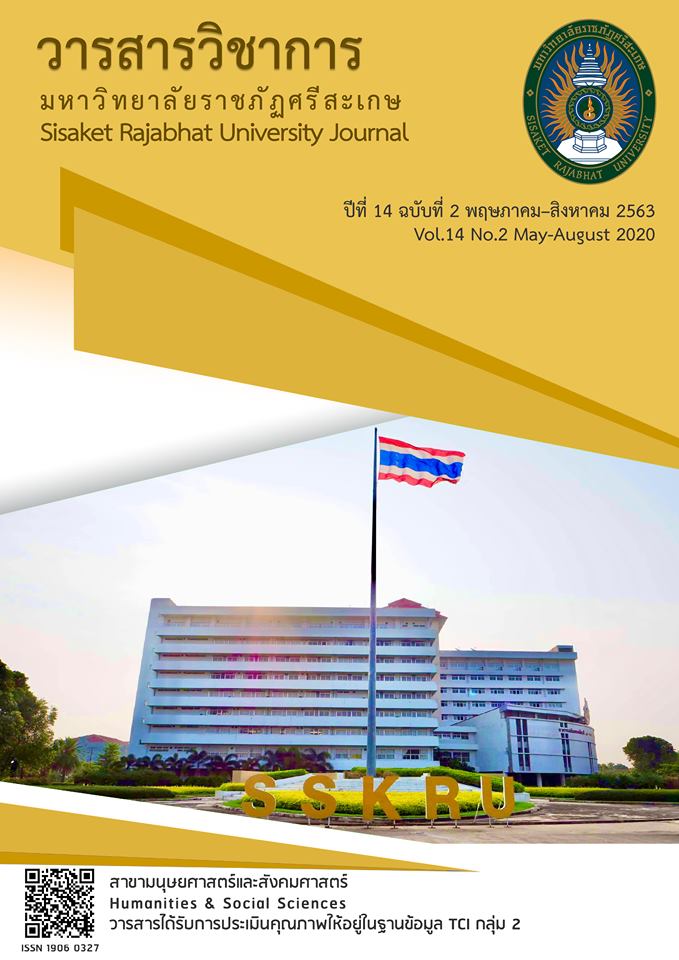การพัฒนาความสามารถในการสร้างแบบจำลองของนักเรียนชั้นมัธยมศึกษาปีที่ 4 รายวิชาชีววิทยา ด้วยการจัดการเรียนรู้โดยใช้แบบจำลองเป็นฐาน
Main Article Content
บทคัดย่อ
การวิจัยครั้งนี้มีเป้าหมายเพื่อพัฒนาความสามารถในการสร้างแบบจำลองด้วยการจัดการเรียนรู้โดยใช้แบบจำลองเป็นฐาน มีกลุ่มเป้าหมายเป็นนักเรียนระดับชั้นมัธยมศึกษาปีที่ 4 ในโรงเรียนขนาดใหญ่พิเศษแห่งหนึ่งในจังหวัดร้อยเอ็ด จำนวน 36 คน ที่กำลังศึกษาในภาคเรียนที่ 2 ปีการศึกษา 2562 โดยการเลือกกลุ่มเป้าหมายแบบเจาะจง เครื่องมือที่ใช้ในการวิจัยประกอบด้วย แผนการจัดการเรียนรู้โดยใช้แบบจำลองเป็นฐาน เรื่อง โครโมโซมและสารพันธุกรรม จำนวน 9 แผน แบบประเมินความสามารถในการสร้างแบบจำลอง มี 4 องค์ประกอบคือ การสร้างแบบจำลอง การใช้แบบจำลอง และการปรับปรุงแบบจำลอง โดยการวิจัยครั้งนี้เป็นการวิจัยปฏิบัติการ ซึ่งมี 4 ขั้นตอน 1) วางแผน 2) ปฏิบัติ 3) สังเกต 4) สะท้อนผล โดยมีการปฏิบัติ 3 วงรอบ วงรอบละ 3 แผนการจัดการเรียนรู้ ผลการวิจัย พบว่า นักเรียนมีคะแนนเฉลี่ยของความสามารถในการสร้างแบบจำลองที่เพิ่มขึ้นโดย ในวงรอบที่ 1 นักเรียนมีคะแนนความสามารถในการสร้างแบบจำลองเท่ากับ 12.17 คิดเป็นร้อยละ 75.38 โดยมีคะแนนการสร้างแบบจำลองมากที่สุด คือ 3.71 วงรอบที่ 2 มีคะแนนความสามารถในการสร้างแบบจำลองเท่ากับ 13.14 คิดเป็นร้อยละ 82.12 โดยมีคะแนนการใช้แบบจำลองมากที่สุดเท่ากับ 3.57 คะแนน และวงรอบที่ 3 มีคะแนนความสามารถในการสร้างแบบจำลองเท่ากับ 13.86 คิดเป็นร้อยละ 87.50 โดยมีคะแนนการสร้างแบบจำลองมากที่สุดเท่ากับ 3.86 คะแนน การจัดการเรียนเรียนรู้โดยใช้แบบจำลองเป็นฐานสามารถพัฒนาความสามารถในการสร้างแบบจำลองของนักเรียน และสามารถนำไปประยุกต์ใช้ในการจัดการเรียนการสอนได้
Article Details
1. เนื้อหาและข้อมูลในบทความที่ลงตีพิมพ์ในวารสารวิชาการมหาวิทยาลัยราชภัฏศรีสะเกษ ถือเป็นข้อคิดเห็นและความรับผิดชอบของผู้เขียนบทความโดยตรง ซึ่งกองบรรณาธิการวารสาร ไม่จำเป็นต้องเห็นด้วย หรือร่วมรับผิดชอบใด ๆ
2. บทความ ข้อมูล เนื้อหา รูปภาพ ฯลฯ ที่ได้รับการตีพิมพ์ในวารสารวิชาการมหาวิทยาลัยราชภัฏศรีสะเกษ กองบรรณาธิการไม่สงวนสิทธิ์ในการคัดลอกบทความเพื่อการศึกษา แต่ให้อ้างอิงแหล่งที่มาให้ครบถ้วนสมบูรณ์
เอกสารอ้างอิง
Americans: Project 2061(online). Available:
http://www.project2061.org/publications/sfaa/online/chap1.htm.
Accessed: [April 10, 2020]
Bryce, C., Baliga, V. B., de Nesnera, K., Fiack, D., Goetz, K., Tarjan, L. M., … Gilbert, G. S. (2016). Models in the NGSS biology classroom. American Biology Teacher, 78(1), 35–42.
Giere, R. N. (1988). Explaning science: A cognitive approach. Chicago: University of
Chicago Press.
Gilbert, J. K. (2004). Models and modelling: Routes to more authentic science education.
International Journal of Science and Mathematics Education, 2(2), 115–130.
Gobert, J. D., & Buckley, C. (2000). Introduction to model-based teaching and learning in
science education. International Journal of Science Education, 22(9),
891–894.
Kiatphimon, N., Chantraukrit, P., & Pollawatn, R. (2017). Effects of using representation
construction approach on modelling ability and learning achievement in biology
upper secondary school student. An Online Journal of Education,
(12)1, 188-203. [in Thai]
Ladachart, L., & Ladachart, L. (2017). Science teachers ’ perspectives on and
understandings about scientific models. Journal of Community Development
Research (Humanities and Social Science), 10(3), 149–162.
Martínez Solano, J. F. (2016). Wenceslao J. Gonzalez : Bas van Fraassen’s approach to
representation and models in science. Journal for General Philosophy
of Science, 47(1), 261–264.
Office of the Basic Education Commission. (2002). Classroom assessment guideline,
science department basic core curriculum B.C. 2544. Bangkok,
Express Transportation Organization of Thailand. [in Thai]
Ngamchat, P., & Termtachatipongsa, P. (2003). Scientific conceptual change and the
relationship between self-esteem and conceptual change on plant reproduction
of grade 11 students using conceptual change strategies. Journal of Education
Graduated Studies Research, 8(1). 164-171. [in Thai]
Schwarz, C. V., & White, B. Y. (2005). Metamodeling knowledge: developing students’
understanding of scientific modeling. Cognition and Instruction, 23(2), 165–205.
Schwarz, C. V. (2009). A Learning Progression of Elementary Teachers’ Knowledge
and Practices for Model-Based Scientific Inquiry. In Aera (pp. 1–16).
Schweingruber, H. A., Keller, T. E., & Quinn, H. R. (2012). A Framework for K-12 science
education: practices, crosscutting concepts, and core Ideas K-12.
Washington: The National academies Press.
Supatchaiyawong, P., Faikhamta, C., & Potjanart Suwanruji. (2015). Using Model-based
learning for enhancing mental model of atomic structure and understandings of
the nature of model of 10th grade students. Journal of Learning Innovations
Walailak University, (1)1, 97-124. [in Thai]


